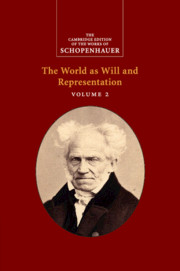Chapter 45 - On the Affirmation of the Will to Life
Published online by Cambridge University Press: 30 June 2022
Summary
If the will to life presented itself merely as a drive for self-preservation, it would be only an affirmation of the individual appearance for the span of its natural duration. The worries and cares of such a life would not be great, and so existence would prove easy and cheerful. On the other hand, because the will wills life absolutely and for all time, it presents itself at the same time as the sex drive, which has an endless series of generations in view. This drive abolishes the carefree attitude, the cheerfulness and innocence that would accompany a merely individual existence by bringing disquiet and melancholy into consciousness, and misfortune, trouble and misery into the course of a life. – If however it is voluntarily repressed, as we see in rare exceptions, then this is the turninga of the will, which reverses itself. It then goes out in the individual, instead of going beyond him. But this can only take place through a painful violence that the individual inflicts on himself. But if it does happen, then the consciousness recoups that carefree cheerfulness of the merely individual existence and, indeed, is raised to a higher power. – On the other hand, when that most vehement of all drives and desires is satisfied, then a new being comes into existence, and thus a continuation of life with all its burdens, cares, needs and pains, admittedly in another individual – but, if the two who are distinct in appearance were distinct absolutely and in themselves, then where would eternal justice be? – Life presents itself as a task, a lesson to be worked out, and thus typically as a constant struggle against need. This is why everyone tries to get through it as well as he can: he gets through life like bonded labour to pay off a debt. But who has contracted this debt? – The one who begot him, in the enjoyment of sensuous pleasure. And so, for the pleasure of the one, the other must live, suffer, and die. We know and should recall in this context that space and time are the condition under which similar things are differentiated, a condition that I have in this sense termed the principle of individuation.
- Type
- Chapter
- Information
- Schopenhauer: The World as Will and Representation , pp. 583 - 587Publisher: Cambridge University PressPrint publication year: 2018



